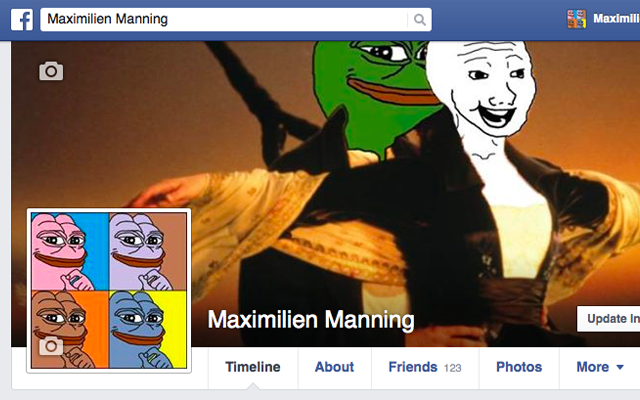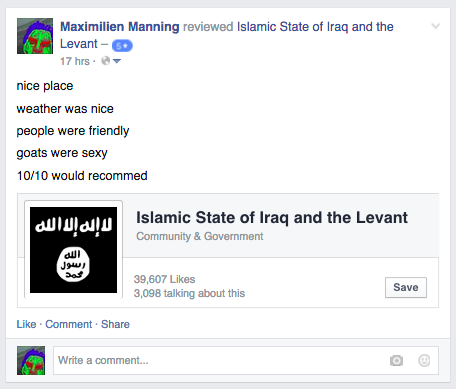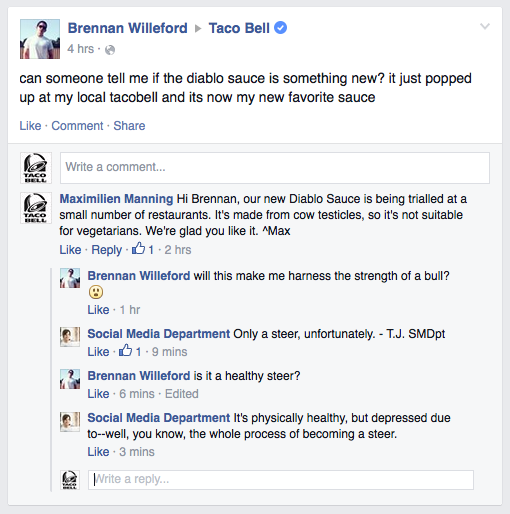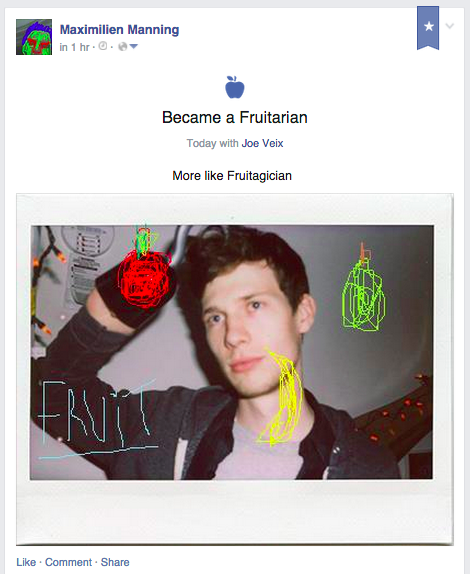Last week, 27-year-old writer and artist Joe Veix decided to publish the login details of a Facebook account.
log in today at http://t.co/tOEkiuRUD9 un: thepublikfacebook@gmail.com pw: password1234
Veix told BuzzFeed: "A while back someone attempted to hack into an email address I had set up for a novelty social media account, so I changed all of my personal passwords in a paranoid frenzy. This got me thinking about account security and the individualistic assumptions of social media."
He said he was also inspired by Mark Zuckerberg's attempt in 2010 to equate a Facebook account with personal integrity, which he found "dubious and creepy and depressing".
"Does a Facebook profile truly represent a person?" Veix said. "No, of course not, that's ridiculous. But then I was curious to see what an account might look like if it were communal – what would be different about it?"
An hour after he put the login details, someone changed the password and locked the account. He reset it.
ladies and gentleman, apologies for the technical difficulties, someone seems to have changed the password, we will be back online shortly
Then it got weird. First of all, someone changed the account name from "John Smith" to "Maximillien Manning".

Then people started changing the cover picture and profile photos. A lot.
"Max" started to add dozens of friends, and started to like all of their posts. He held a variety of jobs in various places including Uber and Taco Bell, and his location kept changing.
And boy did Max like a lot of stuff.
communal facebook likes
As Veix later wrote in a piece for Death and Taxes:
Max liked 322 things, including: the Buffalo Bills; dozens of wedding planning pages; something like 50 pet crematoriums; a bunch of communist pages; numerous topic-specific memes (gym memes, soccer memes, farming memes, etc); Stacy's Mom; Good Charlotte; 12 Street Fighter characters; Blockbuster; Elmer's glue; the Spin Doctors; Marky Mark and the Funky Bunch; and poop.
Max also reviewed ISIS...

...and had a baby with his creator.
a nice baby
Then someone changed the profile photos to the Taco Bell logo, updated Max's job to Customer Service Representative and...well...this started happening.

As you can see in Veix's piece, at least one person fell for it.
So by now, this account was pretty popular. How had it spread? Veix told BuzzFeed he had "no idea" beyond his initial circle of friends and followers, but he has an intriguing explanation.
"Obviously this is very very very unscientific," he said, "but it seemed like the account's posts were made more visible in others' feeds by Facebook's algorithm, which (as far as I know) favours 'correct' usage of the site's tools."
In other words: "The account spammed other people's feeds like crazy, because it sort of just did what Facebook wants us all to do. This might also explain how so many strangers found it."
While he stresses this is just speculation, as he pointed out in his resulting article, it's certainly weird how a fake profile that "spammed the shit out of everyone" appears, in Facebook's eyes, to have more legitimacy than "an actual profile run by an Ethiopian LGBT activist operating under an alias so as not to be arrested and face a 15-year prison sentence".
Indeed, said activist's case is far from the only example of users with legitimate reasons not to use their real names being banned.
In a Facebook comment on June 30, Zuckerberg defended the real names policy, He wrote, in part:
First, it helps keep people safe. We know that people are much less likely to try to act abusively towards other members of our community when they're using their real names. There are plenty of cases -- for example, a woman leaving an abusive relationship and trying to avoid her violent ex-husband -- where preventing the ex-husband from creating profiles with fake names and harassing her is important. As long as he's using his real name, she can easily block him.
Facebook didn't immediately return a request for comment Wednesday.
By the time the weekend was over, the account had over 100 users from around the world. So Veix decided to branch out to Twitter and Instagram.
PublikFacebook™ is now expanding. twitter: @publiktweets ig: http://t.co/vaVbBU6nde pw: password1234
No one really used the Instagram account, but the Twitter one went crazy.
that was fast
In his piece he would describe it as "sort of like 4Chan on methamphetamines". There were weird photos posted on it, along with the lyrics to "One Headlight" – and then someone decided to harass a teenage girl, whereupon he shut it down.
As he pointed out, it's interesting that Facebook, "a typically boring, straight-laced place (unless you stumble into Weird Facebook) — got so bizarre so fast, while over on Twitter — a place where harassment is still a major problem — the account immediately became a venue for abuse".
He told BuzzFeed he didn't think that the difference was necessarily due to Facebook's real-name policy: "Many people are really proud of their terrible beliefs! Just look at the comment section on any post from any news outlet, especially if it involves the Confederate flag."
For Veix, the real-name policy "seems like a very convenient, PR-friendly way of forcing users to hand over all of their personal information to Facebook, to be sold to advertisers".
Meanwhile, on Facebook, things carried on being playful and weird.

Someone from Cardiff made Max a "fruitarian", and then this picture of Veix was added by someone from London.
When Veix wrote up his experience for Death and Taxes, Max was the first to comment.
fitting that the first comment is from the communal profile
But then, sadly, it all came to an end.
RIP
😭 😭 😭
the last thing 'max' said to me, before facebook murdered him http://t.co/SoBPRYbITF
What had Veix learned? Well, one lesson was about how we use social media.
As he wrote, when the Facebook feed is communal, "It's like injecting pure, uncut Facebook directly into your bloodstream." And actually, this wasn't a bad thing: It was, he felt, "for once, actually surprising and fun".
Veix told BuzzFeed: "For the most part, these sites are just tools that allow us to create/access networks, and we get out of them largely what we put into them."
He said that "if you just turn on your laptop, with its greasy, dandruff-covered keyboard, and expect to be entertained – without putting any real work in – you're going to get lazy garbage in return.
"The optimistic part of me thinks that, if only we used these tools in a slightly different manner, they might be fun/interesting again, despite the upsetting corporate ideologies that currently rule them.
And here comes the twist...
BuzzFeed asked Veix why he hadn't performed the experiment on Tumblr. He said he'd meant to but he'd been overwhelmed keeping track of the other accounts, and had also had to rush his piece out.
But. He said: "Let's find out!"
login: thepublikfacebook@gmail.com pw: password1234
Enjoy, everyone...
